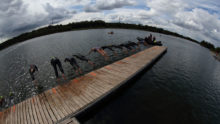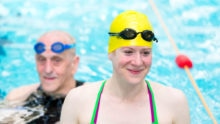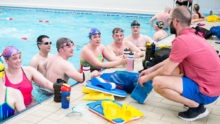
10 tips for communicating with Masters swimmers
March 1, 2017Communication is one of the aspects of swimming coaching where there is the biggest difference between Masters and age group swimmers.
The age group are more conditioned to listen and act on what the coach says, particularly if their parents are watching from the gallery.
Masters coaching CPD
Swim England have also worked with a number of British Masters swimmers and coaches to produce an unofficial CPD for Masters swimming coaches.
- Click here to access it.
But communication with a Masters swimmer is much more of a two-way street. The swimmer is choosing to be there, will have been coached by different people in different ways, and will have their own ideas as to how to improve.
10 tips for communicating with Masters swimmers
Try these 10 communication tips to help coaching your Masters swimming squad.
- Avoid jargon
You may not even realise how much jargon is used in swimming coaching. And while your Masters swimmers who swum as children may well know what you mean, those who are new to the coaching environment may not. - Explain your sets
Different phrases mean different things to swimmers and coaches. Some of your swimmers might know your set by a different name so be as clear as possible. - Don’t use acronyms
Again, be clear what you mean. SMART to one person might mean swimming quickly, while to another it will mean ‘Specific, Measurable, Accurate, Realistic and Timed’. - Match body language and words
Make sure your facial expression and body language are saying the same thing as the words you use. - Be honest
If you make a mistake, talk about it. Masters swimmers will respect you for owning up to mistakes and can discuss solutions with you. - Listen to your swimmers
Though you may not want to believe it, Masters swimmers do sometimes have good ideas! They will also want to discuss their progress with you. Be open with them and listen to what your swimmers have to say. - Earn two-way respect
Masters swimmers may take a bit of time to fully trust you, but once you are acting together and as one, you can achieve the best results. Take the time to build relationships with each swimmer and earn their trust and respect. - Keep a good sense of humour
Sometimes the social aspect and having fun are the most important part of Masters swimming. Nobody will enjoy swimming training if it is super-serious 100 per cent of the time. - Involve the swimmer
It’s closely tied in with listening and earning their respect, but Masters swimmers will want to be involved in their own coaching process. They need to feel involved in what happens to them and understand what they are doing and why. - Each person is different
Each Masters session will have very different swimmers participating, with a range of abilities. They will have different requirements and needs, far more than for your average age group squad.
 Masters Swimming Hub
Masters Swimming Hub


